Student Blog
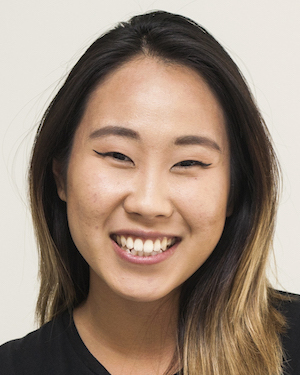
Can I Work In Grad School? ⟩
November 8, 2018, by Joyce
My answer to you would be that it depends. I know, everyone’s favorite answer to hear. However, I say it depends because it truly is dependent on the kind of learner you are and how efficient you are in managing your time.
In the beginning of the program (summer session) I chose not to work because of the intensity of the program (M-F 8AM-4PM). In addition to the academic and coursework, I was also couch hopping because I literally picked up my entire life and moved across the country. There was a lot of instability and uncertainty during that summer and if I were to add that extra dimension of work, I knew it would take a physical, mental, and emotional toll.
Thankfully I survived the summer program and in the fall semester, I began my Adult Rehabilitation Immersion. Each practice immersion varies but the Adult Rehabilitation one is known for its intense studies in various medical diagnoses and conditions. Therefore, I decided that this semester would not be the best semester to start working because I would much rather absorb and obtain this information to the best of my abilities without any other distractions. Not working and taking out additional loans opened up space in my schedule to read my notes and study a few extra hours.
It was when I began the Mental Health Immersion that I felt that there was enough room and space in my life to add a part time job. Therefore, I began to work as a hostess at a Korean BBQ restaurant. My shifts required me to be in on the weekends. I had a great time, it was nice to be involved in something non-OT related. Don’t get me wrong, I love the profession and I love the people that I interact with but working at a restaurant brings about a different kind of aura. I met many international travelers (as our restaurant is rated 4.5 stars on yelp and highly popular amongst tourists!). I enjoyed the customer service aspect and even casually conversing with people as they walked in and out of the restaurant.
I came home pooped from standing all day but it was nice to be able to make some money and use a different set of skills. So to answer your question, yes it is possible to work while you study. But in the midst of it, remember that you are still a student first and that your academics takes priority. Something that I have learned to do is weighing the pros and cons of the situation. Is it worth losing three hours of sleep every night to work a few hours and do homework to earn maybe $50? I guess it would depend on the kind of part time job you decide to pick up as well. I have classmates who babysit for higher rates for shorter times and others who work longer shifts in the food industry but making most of their income on tip.
So, is it doable? Yes, but it depends.
⋯
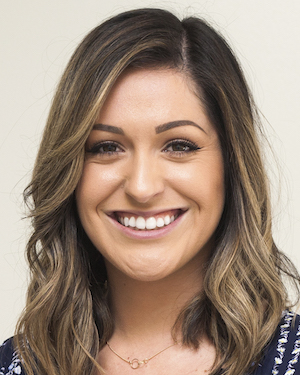
What is it like to be a Student Ambassador? ⟩
November 4, 2018, by Melissa
Hey guys! For this post I wanted to talk a bit about what I do as a Student Ambassador. I feel like we do a bit of everything, therefore I wanted to offer some more insight in case any of you would like to pursue this position when you’re in the program!
First, I want to provide a bit of background information on my journey to becoming a Student Ambassador. When I was first considering applying to USC, I attended an information session and had my first interaction with an Ambassador. I remember thinking, “Wow, that’s such a cool opportunity for students!” but didn’t think much about it after that as I was more concerned with getting into the program at the time. As the application date got closer, I scheduled a meeting with Dr. Carley — the previous Director of Admissions — and a tour with a Student Ambassador. It was an incredibly personal experience; Dr. Carley answered some of my burning questions about the application, and the ambassador shared about her experience with the program and answered my questions regarding life as a student. It was then that I realized how badly I wanted to get into the OT program at USC, and how much I would love to be a Student Ambassador.
Fast-forward two years, and here I am! It’s still pretty surreal to think back to that time, and I’m incredibly grateful to be able to be a part of this program and to be an Ambassador. This position gives me the opportunity to combine my passion for the program and my passion for occupational therapy all into one!
So what exactly do we do? Well, I wasn’t kidding when I said that we do a little bit of everything. We help with information sessions, we correspond with potential applicants and admitted students, we give presentations to pre-health and pre-OT clubs to spread the word about our program and OT as a whole, we present and table at conferences and grad fairs, we give tours to students and their families, and help with all sorts of events! Although there are things that we all do as Ambassadors, there are also things that are unique to each of our positions! For example, Joyce is in charge of all things social media, Serena and I help the admissions team and have Diversity projects that we work on, Jess is responsible for event planning, and Evan works on the content calendar! We each get to work on things that appeal to us and that we have a skill set in, which makes the job even more interesting. In addition, we have an Ambassador from the OTD program as well as the MA-I (post professional) program, which makes us a pretty well rounded team. They each correspond with students that have questions about their specific programs, and have their own individual projects as well.
Ultimately, this job provides us with a great opportunity to advocate for our profession, to increase awareness about OT and the Chan program, and to give potential applicants information about our program from a student’s point of view, among many other things. I’m very lucky to be a part of a team that is made up of such kind, hard-working, and passionate people that make the job so much fun.
If you have any questions about the position or about scheduling a tour with us, feel free to reach out!
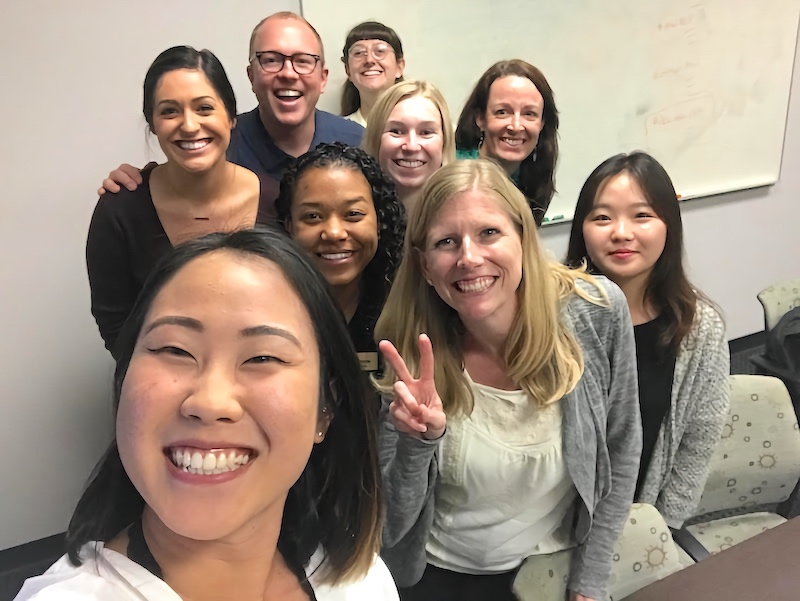
⋯
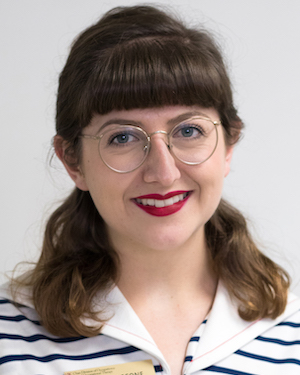
Presenting at Conference ⟩
November 2, 2018, by Antonietta
The past few weeks have been so exciting (and exhausting). I presented at two conferences; the first was AOTA’s Education Summit, in Louisville, KY, and the second, closer to home, was the OTAC’s annual conference in Pasadena. It was an amazing experience and I wanted to share a little bit about it!
In the second year of the Master’s program, I elected to do Directed Research (OT590) with Dr. Rafeedie, completing 2 units in the Fall and 2 units in the Spring. As I’ve mentioned before, I’m interested in education so I created this experience to do some research about pedagogy and best practices when it comes to simulation. My inspiration for this topic stemmed from being frustrated in some of my courses when asked to role play with my peers. I was quite uncomfortable role playing and I was not convinced it added my clinical skills as a future occupational therapist. From this seed of frustration grew the foundation of our presentations: a low to high fidelity chart for the different types of simulations, an evidence matrix outlining the support for simulation in education, recommendations from the literature about best practice surrounding this instructional method, and finally a piece that I was not expecting at all when I started out. This unexpected piece was the most interesting of them all . . . looking at simulation from the disability perspective.
Upon reflection, this perspective is the root of why I was uncomfortable with simulation in class. Although the goal was to learn, it felt a little bit like a mockery when I pretended to have a prescribed difference. It took looking at this in class requirement from an outside, academic point of view, and discussing it with my mentor to be able to identify the source of this discomfort and start to think critically yet constructively about it. We went to the disability literature and discovered that since the 1990s it has contained a call to stop disability simulation. It cites research which has shown that disability simulation has many unintended consequences. So, we looked further, read more research, and started to build an idea of what types of simulation add to positive educational outcomes and how we can use simulation respectfully and ethically. The bottom line is, we need to be coupling simulation with lived experiences perspectives. As OTs, we valued the phenomenological components of care and recovery that simulation does not provide. These nuances, which simulation simply cannot capture, are what sets us apart from other healthcare professionals. We must be mindful about explicitly including the disability perspective in our curriculum and learning activities.
It was exhilarating to share what we found and developed at the two conferences. Our audiences were very active participants with many questions and different points of view to share. This has been an amazing way to end this project (for now) and it was only possible because of Dr. Rafeedie and USC, so Fight On!
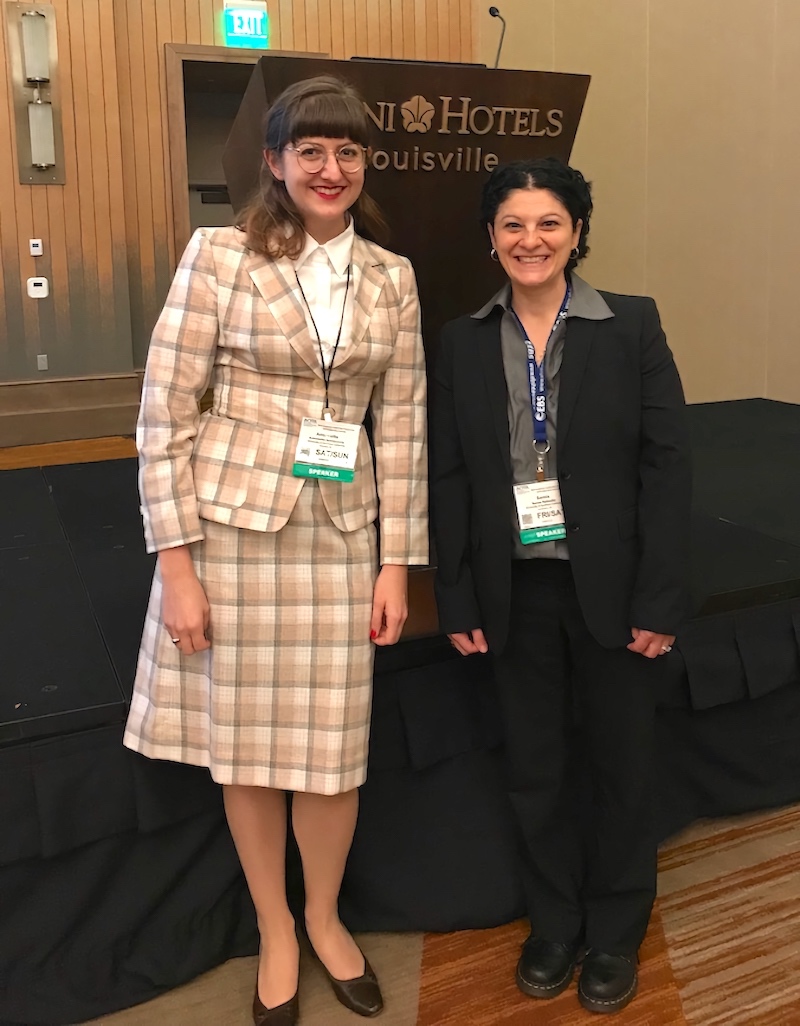
⋯

How to Apply to Grad School ⟩
November 1, 2018, by Joyce
It’s tough. I thought I was done with common app years ago never having to go through such a system again. But luckily, it is possible and applying to grad schools does not have to be as stressful as it sounds! Hopefully these few tips will help you with your application journey:
1. Get to know the system
&& I mean every system, the OTCAS, the GRE website, the USC admissions portal. Each website and server that the school uses varies. Become familiar with each of them so you understand how they work and function. I usually take a day just to make an account (also write your password somewhere so you don’t forget it!) to understand the system and then walk away from it. It’s important to do things in small increments because I find that doing everything at once can be super overwhelming.
2. Read the prompt!!!
OTCAS has a prompt. Each school you apply to will probably have a different prompt that you need to cater your essay to. It’s super easy to get distracted while you write and while you write you start to think of new ideas and stories to include. It’s important that you keep true to the prompt at hand and make sure that it answers it!!! It’s awesome that you went sky diving in Thailand, took care of endangered elephants, and worked with the community. But if the prompt is asking about how you define OT, you better put in somewhere in that story that connection to OT. That being said . . .
3. Have people you trust to read your personal statement
I say this carefully because you have limited time and so does everyone else. Go to the friends/mentors that you know have strong writing skills and ask them to read over your essay. This will maximize the time you have and also allow for constructive feedback as to how to better your statement.
4. Reach out
Working with the admissions team now, I understand how valuable it is to put a face to a name. Reach out to the admissions team of the program and ask questions. Who better to answer the questions that you have than those who will be reviewing your applications? Ask about pre-requisites, GRE scores, and student life. More often than not, your questions will be answered. In addition, if possible, try to go for an info session and explore what the learning environment is like. You will be committing 2.5 years of your life to this program, you would want to know what your day to day life would look like!
5. Organization
This is the last and most important advice I can provide. STAY ORGANIZED. Whether that’s through a color-coded calendar or reminders on your iPhone, deadlines will come and go. Things will fall through the cracks if you’re not vigilant about deadlines, fee waivers, payments, etc. Personally, I printed out on a word document all the schools I planned to apply for, their respective due dates, and the prerequisites of each program. Then throughout the month, I would highlight through the ones that have been completed and done with. It gave me the satisfaction of being done but also that visual reminder of what more needs to be done.
It’s possible. Take a deep breath and believe in yourself. Don’t forget to engage in self-care activities throughout it all. Good luck!
⋯
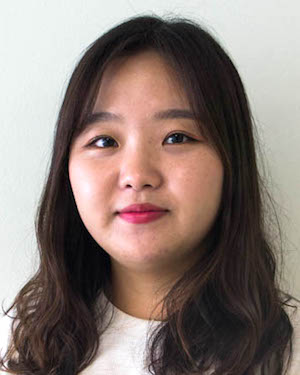
Being in Graduate School as an International Student ⟩
November 1, 2018, by Goeun
Time flies and it’s already halfway through the first semester. 10 weeks has been already passed and I’ll introduce what I did by month.
August
This month was the time that I finally set up everything for graduate school as an international student and started my new journey in the Post-Professional Master’s Program. I had orientation from USC and our division, registered courses, had PPV (passport verification), got my student ID, etc.
Fall semester started on August 20, then we had the white coat ceremony on the same week, which let us feel that we really started. At the end of this month, Dr. Blanche, our program director and professor of clinical occupational therapy, invited all post-professional students, Dr. Park, Dr. Cermak, and Dr. Gray to her house, which is near a beautiful beach and we had BBQ party and had a wonderful time.
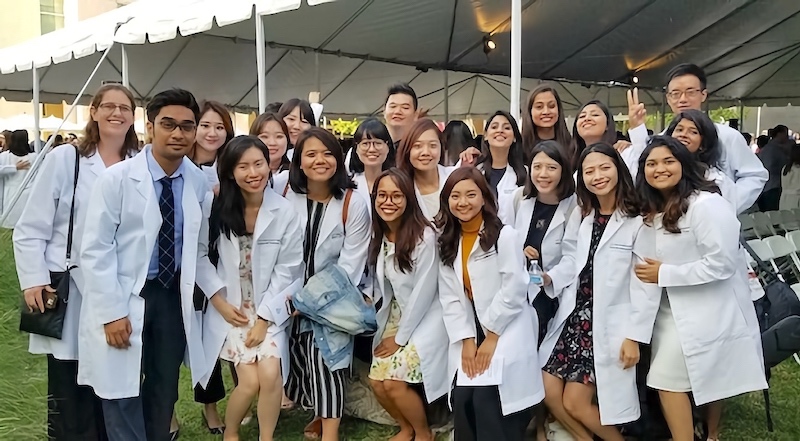
The White Coat Ceremony made us feel that we really started the Master’s program
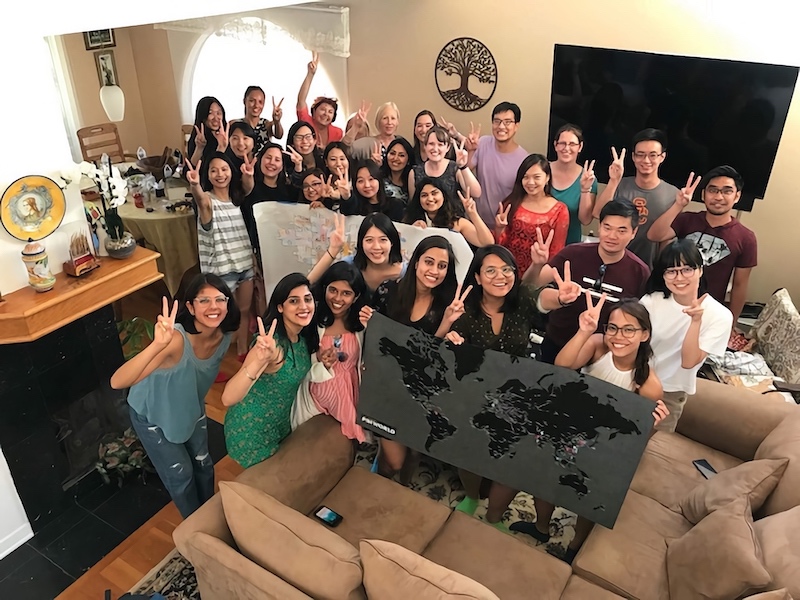
The Post-Professional students went to Dr. Blanche’s house and had a BBQ party together
September
While August was kind of like a warm-up month, September was the month that we really started academics, getting used to all the readings, exams, and assignments. Because English is not my first language, it was tough for me to understand and keep up with the lectures at the beginning, but thanks to Global Initiatives, we have a study hall that provides academic support to international students. More than that, we had dinner with Dr. Cermak at a Chinese restaurant which was awesome and fun.
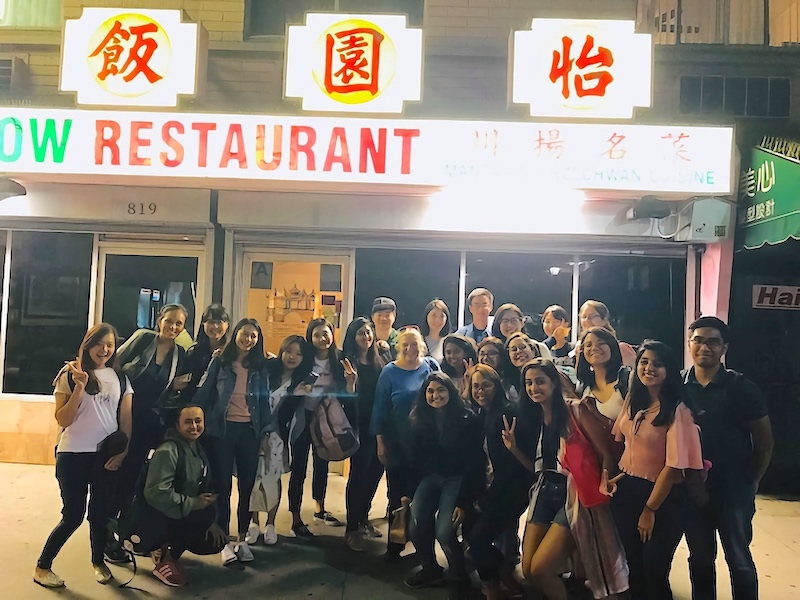
We took a picture when we had dinner with Dr. Cermak in the Chinese restaurant
October
Since we’re getting more into the semester, it was time to think about the next semester. We’re taking 5 required courses and 1 elective course. However, unlike this semester, we’ll mostly take elective courses in the Spring semester, so we had to think about what to take. Also, we had a wonderful dinner with Dr. Cermak in an Indian restaurant, this time with Dr. Blanche, Dr. Ochi, and Dr. Vigen. In addition, on October 25-28, OTAC was held in Pasadena. It was a great opportunity to attend the conference as an OT student and learn more about it.
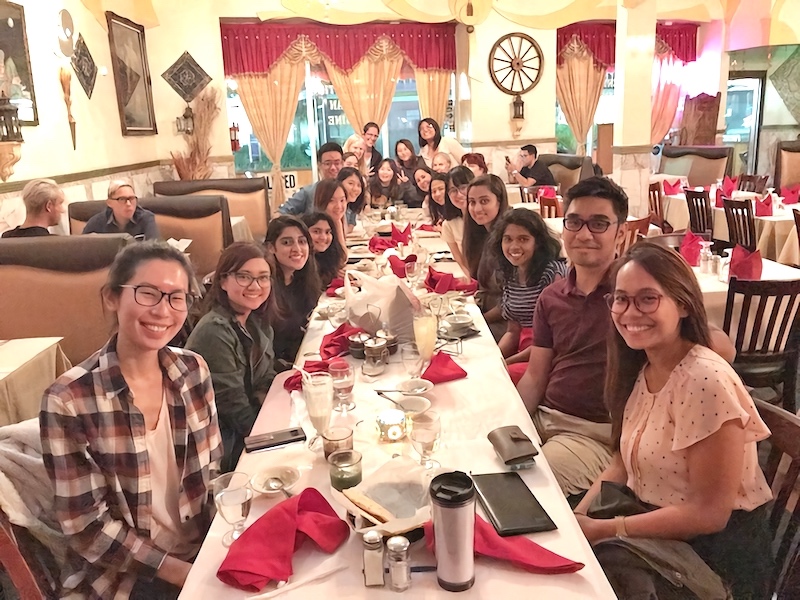
We took a picture when we had dinner with Dr. Cermak at an Indian restaurant after finishing one of our big projects
This was my journey as a post-professional student so far. It was not easy but so great that I could learn and have those experiences. I’m excited about the rest of this semester as well as the next semester and hope everything goes well!
⋯





